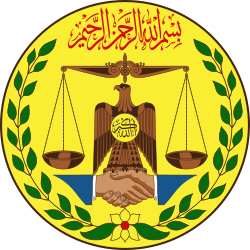Electoral system
The 12 elected members were elected from six two-member constituencies. Three urban constituencies (Hargeisa, Berbera and Burao) had direct elections, whilst the members in the three rural constituencies were elected by the shirs (open councils). [1]
In the rural constituencies all men over the age of 21 were allowed to participate in the shirs. In urban areas people could qualify to vote if they owned or rented land or a house, owned a registered car, 10 camels or cattle or 100 sheep, owned a trade licence, or had been in public service or employment for at least two years. [1] Only 2,508 people registered to vote in the three urban constituencies. [5]
Candidates were required to own or rent land worth at least 5,000 shillings, a monthly income of at least 300 shillings or individual ownership of at least 10 camels or cows or 100 sheep, or family ownership of at least 40 camels or cattle or 400 sheep, or own an agricultural licence. [1]
This page is based on this
Wikipedia article Text is available under the
CC BY-SA 4.0 license; additional terms may apply.
Images, videos and audio are available under their respective licenses.
